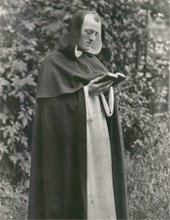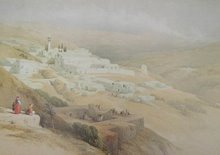“Every minister of holy religion must bring to the struggle the fullIf there is one thing, one single line of text, that could be said to have motivated the tireless apostolic work of Father Vincent McNabb, it is this line from the encyclical Rerum Novarum of Pope Leo XIII. This great papal “call to arms”, issued by Holy Mother Church just weeks before Father McNabb was ordained as a priest in the Dominican Order at the age of 23, illuminated all of his work and action: after Holy Scripture and the works of St Thomas it held pride of place in his heart. This should perhaps not be so surprising since he was a Dominican working for a large portion of his life in the slums of England, and Rerum Novarum was written - it is said - by Cardinal Zigliara, a noted Dominican scholar, in collaboration with the Pope, and was undoubtedly influenced by the life and work of the great English Cardinal Manning. Yet certainly no priest, no religious in England was as indefatigable as Father McNabb in his desire - in his work - to see the blue-print of Rerum Novarum put into action. Indeed, those Dominican students he taught while at Hawkesyard Priory remembered being instructed to keep a copy of the encyclical beside their beds: and his biographer (-of-sorts), Father Ferdinand Valentine, recalled being told to memorise the paragraph which Father McNabb thought was most central to Pope Leo’s work:
energy of his ‘mind’ and all his powers of endurance.”
“There is general agreement that some opportune remedy must be found quickly for the misery and wretchedness pressing so unjustly on the majority of the working class: for the ancient working-men’s guilds were abolished in the last century, and no other protective organisation took their place. Public institutions and the laws set aside the ancient religion. Hence by degrees it has come to pass that working men have been surrendered, isolated and helpless, to the hard-heartedness of employers and the greed of unchecked competition. The mischief has been increased by rapacious usury, which, although more than once condemned by the Church, is nevertheless under different guise, but with the like injustice, still practised by covetous and grasping men. To this must be added that the hiring of labour and the conduct of trade are concentrated in the hands of comparatively few; so that a small number of very rich men have been able to lay upon the teeming masses of the labouring poor a yoke little better than that of slavery itself.”
It was to those living in the slums and decaying tenements and to those working in the factories and sweat-shops of London that Father McNabb brought these words of the Vicar of Christ: and as a priest he brought to them Christ’s power to inspire and to heal.
It is evident that Father McNabb is hardly known amongst Catholics today. Even amongst those who concern themselves with Tradition many may know his name but little more. Some may be aware that he is associated with that set of ideas known as Distributism (for which he was the principal inspiration); some that he was a well-known Dominican friar who frequently spoke at Parliament Hill and at Speaker’s Corner to the motley London throng; some that he was at one time a friend of Eric Gill and was connected with his community at Ditchling; perhaps most of those who have heard of him stumbled across his name while reading about Hilaire Belloc or G K Chesterton. All these mental associations are indeed aspects of the man, of the priest; yet he would, I think, like best to have been known for championing Rerum Novarum.
Father McNabb was - with some notable exceptions, principally within his own Order - held in high esteem by his contemporaries, even by those such as George Bernard Shaw or the Webbs, founders of the socialist Fabian Society, who could have most been expected to dislike him. During Father McNabb’s life, G K Chesterton wrote of him, in the introduction to his, Father McNabb’s, book, Francis Thompson And Other Essays:
“Now I am nervous about writing here what I really think about Father Vincent McNabb for fear that he should somehow get hold of the proofs and cut it out. But I will say briefly and firmly that he is one of the few great men I have met in my life; that he is great in many ways, mentally and morally and mystically and practically... nobody who ever met or saw or heard Father McNabb has ever forgotten him.”
Hilaire Belloc, who was in many ways temperamentally similar to Father McNabb, wrote this about him after his death in the Dominican journal Blackfriars in 1943:
“The greatness of his [Father McNabb’s] character, of his learning, his experience, and, above all, his judgement, was altogether separate from the world about him... the most remarkable aspect of all was the character of holiness... I can write here from intimate personal experience [here, Belloc refers to Father McNabb visiting Belloc - at the latter’s request - immediately after the premature death of Elodie Belloc, his wife, in 1914] ... I have known, seen and felt holiness in person... I have seen holiness at its full in the very domestic paths of my life, and the memory of that experience, which is also a vision, fills me now as I write - so fills me that there is nothing now to say.”
Perhaps appropriately, that memorial, that obituary, was the last thing that Belloc penned (or dictated) for publication before his death some ten years later.
Monsignor Ronald Knox, who was, in many ways, Father McNabb’s temperamental opposite, wrote, when asked for his opinion on the move - in the 1950s - to start a process for Father McNabb’s beatification:
"Father Vincent is the only person I have ever known about whom I have felt, and said more than once, ‘He gives you some idea of what a saint must be like.’ There was a kind of light about his presence which didn’t seem to be quite of this world.”
But perhaps my favourite tribute to him from his famous contemporaries - in one way at least - comes from the pen of Maurice Baring and through the eyes and ears and reflections of an unbeliever. To give some background: Cecil Chesterton, G K Chesterton’s brother, died in 1918 from trench fever caught while serving at the Front: he had converted to Catholicism in 1913. Before joining up, he had been a pugnacious journalist who had fought against financial and political corruption in Parliament, had been successfully but wrongfully sued by the Isaac brothers for revealing their part in the Marconi Scandal, and was in Belloc’s view the more able of the Chesterton brothers (a view that, I have to add, no-one else seems to have held, the humble G K Chesterton aside). Father McNabb preached at Cecil Chesterton’s funeral: sadly, no copy of the sermon survived (Belloc referred to it as the greatest piece of sacred oratory he had ever heard) but Maurice Baring published a poem in the 1943 August issue of Blackfriars inspired by the comments of an unbeliever friend and poet who had accompanied Baring to the funeral:
“A poet heard you preach and told me this:
While listening to your argument unwind
He seemed to leave the heavy world behind;
And liberated in a bright abyss
All burdens and all load and weight to shed;
Uplifted like a leaf before the wind,
Untrammelled in a region unconfined,
He moved as lightly as the happy dead.
And as you read the message of Our Lord
You stumbled over the familiar word,
As if the news now sudden to you came;
As if you stood upon the holy ground
Within the house filled with mighty sound
And lit with Pentecostal tongues of flame.”


2 comments:
Thanks for your very wise and informative article.
I’d like to ask you to make two clarifications:
1. Could you elaborate on this fragment: “the Government was itself was in the face of war to encourage a return to the land, so as to increase agricultural produce from a degraded and untended land.”? What kind of war (with whom? an internal conflict?) do you mean?
2. When you describe Fr. McNabb’s death you write: “He then became unconscious for half-an-hour, sneezed, and died.” What does “sneezed” mean in this context? “To expel air forcibly from the mouth and nose in an explosive, spasmodic involuntary action resulting chiefly from irritation of the nasal mucous membrane.” – as the dictionary definition goes? Or maybe something of a hiccup or sigh kind?
encore?
Post a Comment